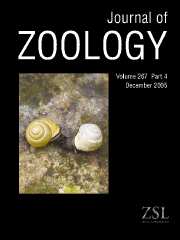Crossref Citations
This article has been cited by the following publications. This list is generated based on data provided by
Crossref.
Machado, Glauco
Raimundo, Rafael L. G.
and
Oliveira, Paulo S.
2000.
Daily activity schedule, gregariousness, and defensive behaviour in the Neotropical harvestmanGoniosoma longipes(Opiliones: Gonyleptidae).
Journal of Natural History,
Vol. 34,
Issue. 4,
p.
587.
Hirata Willemart, Rodrigo
2001.
EGG COVERING BEHAVIOR OF THE NEOTROPICAL HARVESTMAN PROMITOBATES ORNATUS (OPILIONES, GONYLEPTIDAE).
Journal of Arachnology,
Vol. 29,
Issue. 2,
p.
249.
Machado, G.
and
Raimundo, R.L.G.
2001.
Parental investment and the evolution of subsocial behaviour in harvestmen (Arachnida Opiliones).
Ethology Ecology & Evolution,
Vol. 13,
Issue. 2,
p.
133.
Bragagnolo, Cibele
and
Pinto-da-Rocha, Ricardo
2003.
Diversidade de opiliões do parque nacional da serra dos órgãos, Rio de Janeiro, Brasil (Arachnida: Opiliones).
Biota Neotropica,
Vol. 3,
Issue. 1,
p.
1.
Ryotaro Hara, Marcos
Gnaspini, Pedro
and
Machado, Glauco
2003.
MALE EGG GUARDING BEHAVIOR IN THE NEOTROPICAL HARVESTMAN AMPHERES LEUCOPHEUS (MELLO-LEITÃO 1922) (OPILIONES, GONYLEPTIDAE).
Journal of Arachnology,
Vol. 31,
Issue. 3,
p.
441.
Machado, S. F.
Ferreira, R. L.
and
Martins, R. P.
2003.
Aspects of the population ecology ofGoniosomasp. (Arachnida Opiliones Gonyleptidae) in limestone caves in southeastern Brazil.
Tropical Zoology,
Vol. 16,
Issue. 1,
p.
13.
Pereira, Wilton
Elpino-Campos, Abner
Del-Claro, Kleber
and
Machado, Glauco
2004.
BEHAVIORAL REPERTORY OF THE NEOTROPICAL HARVESTMAN ILHAIA CUSPIDATA (OPILIONES, GONYLEPTIDAE).
Journal of Arachnology,
Vol. 32,
Issue. 1,
p.
22.
Mestre, Luiz Augusto Macedo
and
Pinto-da-Rocha, Ricardo
2004.
POPULATION DYNAMICS OF AN ISOLATED POPULATION OF THE HARVESTMAN ILHAIA CUSPIDATA (OPILIONES, GONYLEPTIDAE), IN ARAUCARIA FOREST (CURITIBA, PARANÁ, BRAZIL).
Journal of Arachnology,
Vol. 32,
Issue. 2,
p.
208.
GNASPINI, PEDRO
DA SILVA, MÁRCIO B.
and
PIOKER, FABIANA C.
2004.
The occurrence of two adult instars among Grassatores (Arachnida: Opiliones)—A new type of life-cycle in arachnids.
Invertebrate Reproduction & Development,
Vol. 45,
Issue. 1,
p.
29.
WILLEMART, RODRIGO H.
and
GNASPINI, PEDRO
2004.
Breeding biology of the cavernicolous harvestmanGoniosoma albiscriptum(Arachnida, Opiliones, Laniatores): sites of opposition, egg batches characteristics and subsocial behaviour.
Invertebrate Reproduction & Development,
Vol. 45,
Issue. 1,
p.
15.
Machado, Glauco
Carrera, Patricia C.
Pomini, Armando M.
and
Marsaioli, Anita J.
2005.
Chemical Defense in Harvestmen (Arachnida, Opiliones): Do Benzoquinone Secretions Deter Invertebrate and Vertebrate Predators?.
Journal of Chemical Ecology,
Vol. 31,
Issue. 11,
p.
2519.
Machado, Glauco
and
Warfel, Joseph
2006.
FIRST CASE OF MATERNAL CARE IN THE FAMILY CRANAIDAE (OPILIONES, LANIATORES).
Journal of Arachnology,
Vol. 34,
Issue. 1,
p.
269.
Rayor, Linda S.
and
Taylor, Lisa Anne
2006.
SOCIAL BEHAVIOR IN AMBLYPYGIDS, AND A REASSESSMENT OF ARACHNID SOCIAL PATTERNS.
Journal of Arachnology,
Vol. 34,
Issue. 2,
p.
399.
Beal, Christy A.
and
Tallamy, Douglas W.
2006.
A new record of amphisexual care in an insect with exclusive paternal care: Rhynocoris tristis (Heteroptera: Reduviidae).
Journal of Ethology,
Vol. 24,
Issue. 3,
p.
305.
Almeida‐Neto, Mário
Machado, Glauco
Pinto‐da‐Rocha, Ricardo
and
Giaretta, Ariovaldo A.
2006.
Harvestman (Arachnida: Opiliones) species distribution along three Neotropical elevational gradients: an alternative rescue effect to explain Rapoport's rule?.
Journal of Biogeography,
Vol. 33,
Issue. 2,
p.
361.
Grether, Gregory F.
and
Donaldson, Zoe R.
2007.
Communal Roost Site Selection in a Neotropical Harvestman: Habitat Limitation vs. Tradition.
Ethology,
Vol. 113,
Issue. 3,
p.
290.
Hunter, Rebecca K.
Proud, Daniel N.
Burns, Jessica A.
Tibbetts, Jessica A.
and
Townsend, Victor R.
2007.
PARENTAL CARE IN THE NEOTROPICAL HARVESTMAN PHAREICRANAUS CALCARIFERUS (OPILIONES, CRANAIDAE).
Journal of Arachnology,
Vol. 35,
Issue. 1,
p.
199.
BUZATTO, BRUNO A.
REQUENA, GUSTAVO S.
MARTINS, EDUARDO G.
and
MACHADO, GLAUCO
2007.
Effects of maternal care on the lifetime reproductive success of females in a neotropical harvestman.
Journal of Animal Ecology,
Vol. 76,
Issue. 5,
p.
937.
Donaldson, Zoe R.
and
Grether, Gregory F.
2007.
Tradition without social learning: scent-mark-based communal roost formation in a Neotropical harvestman (Prionostemma sp.).
Behavioral Ecology and Sociobiology,
Vol. 61,
Issue. 5,
p.
801.
Buzatto, Bruno A.
and
Machado, Glauco
2008.
Resource defense polygyny shifts to female defense polygyny over the course of the reproductive season of a Neotropical harvestman.
Behavioral Ecology and Sociobiology,
Vol. 63,
Issue. 1,
p.
85.




